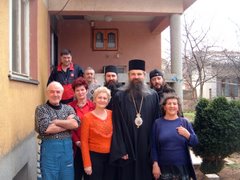The Pope Is Actually In Heresy In Relation to Orthodox Church
Date: Wed, 21 Oct 2009 16:09:45 +0100
Subject: Our Hierarchy should take a joint attitude
To: xenspirit7@msn.com
From: info@eparhija-prizren.com
21.10.2009.
Source: Diocese of Ras-Prizren and Kosovo-Metohija
Our Hierarchy should take a joint attitude
On the occasion of the meeting of the Joint International Commission for the Theological Dialogue between the Roman Catholic Church and the Orthodox Church, to be held on 16 October 2009, His Grace Dr Artemije addressed an appeal to the Holy Synod of Bishops and all the Bishops of the Serbian Orthodox Church late in September, saying that, because of the importance of the theme that is to be discussed in Cyprus gathering, our Hierarchy should take in advance a joint attitude toward the theme which ought to be defended and supported by our representatives at the forthcoming gathering.
Similar appeal was addressed in September to the Greek Orthodox Church by PhD Dimitrios Tselengidis, Professor of the Dogmatic Theology in the Faculty of Theology in Thessaloniki.
+ + +
Address by His Grace Dr Artemije to Hierarchs of Serbian Orthodox Church
The Serbian Orthodox Bishop
of the Diocese of Ras-Prizren
and Kosovo-Metohija
No. 815
28 September 2009
Prizren - Gracanica
TO HOLY SYNOD OF BISHOPS OF SERBIAN ORTHODOX CHURCH
B E L G R A D E
Fathers and brethren,
In ten days there will be the second anniversary of the Ravenna gathering that has been athe cause of many offences and confusions for a long time among the Orthodox people worldwide, and therefore among Serbian people as well. It has been much spoken, written, or discussed about Ravena (i.e. RAVENNA DOCUMENT) so far, yet many questions have remained unanswered. For instance, the question of participation and role of the Serbian Orthodox Church representatives in the work of the Joint International Commission for the Theological Dialogue between the Roman Catholic Church and the Orthodox Church.
In order to have some of these questions answered and cleared, Our humbleness put forward a PROPOSITION to the Holy Synod of Bishops on May 19, 2008 (D. No. 363) consisting of nine clear questions regarding the Ravenna document, but for the lack of due attention, the questions remained open.
The key question in the Proposition was: «How is that possible to discuss "the status of the bishop of Rome in the Church" while the Roman "bishop - pope" is not in the Church but rather outside of it, inside heresy. Don't you think that it is necessary to discuss not his status in the Church but rather his return to the Church? Wasn't the union of the Orthodox and the Roman Catholic Church prejudiced "by this Ravenna document"»?
Today, after two years, further incidents and shakes are looming on the horizon of the Orthodox world. Namely, during 16 - 23 October 2009, a new meeting of Joint International Commission for the Theological Dialogue is to be held in Cyprus, where they will continue to work on the theme they already laid the foundation for in Ravenna, the theme of «the status of the bishop of Rome in the Church». In other words, the theme of the Pope's primacy, his authority and power over the whole Church of Christ.
The theme is highly serious and decisive. It should not and must not be overlooked and let to be considered by only a couple of our representatives. It should be considered by all the Hierarchs of our Holy Church. Thus, We regard it vital to request the Holy Synod of Bishops to call a special session of the Holy Assembly of Bishops of the Serbian Orthodox Church as soon as possible, before the Cyprus meeting takes place, so as the crucial issue of our representatives' participation in Cypus meeting could be discussed and the attitude of our Church toward the issue be settled. Then, that attitude ought to be defended and supported by our representatives at the Joint International Commission for the Theological Dialogue in Cyprus.
The best example of how important is the forthcoming Cyprus gathering for other Orthodox Churches as well, is a written address by professor Dimitrios Tselengidis from Thessaloniki to the Hierarchs of the Greek Orthodoh Church. Please find enclosed the professor's text.
Having trust that our Holy Synod of Bishops will realise the gravity of the situation and accept Our humble proposition, We remain
Faithful in Christ our Lord to the Holy Synod of Bishops.
The Bishop of Ras-Prizren
and Kosovo-Metohija
+ARTEMIJE
Sent to:
All Diocesan Bishops
of the Serbian Orthodox Church
+ + +
Address by PhD Dimitrios Tselengidis to Hierarchs of Greek Orthodox Church
ARISTOTLE UNIVERSITY OF THESSALONIKI
FACULTY OF THEOLOGY
SCHOOL OF THEOLOGY
DEPARTMENT OF DOGMATIC THEOLOGY
PROFESSOR DIMITRIOS TSELENGIDIS
TO: Holy Synod of Bishops of the Greek Orthodox Church
Sent to: All Hierarchs of the Greek Orthodox Church
Your Beatitude esteemed Chairperson,
Your Graces,
Having observed with a deep sense of responsibility the current situation of the Church of our time, I would like, both as a mere believer and as a University Professor of Dogmatic Theology, to humbly address You since You are the highest Governing body of our Greek local Church.
The purpose of my sending this letter to You has come as a result of my recent discussions with some of the Metropolitans[1].
I asked them a clear question, whether the Greek Orthodox Church at the session of the Holy Assembly had considered and taken a clear attitude toward the primacy of the Pope theme that was going to be worked on at the forthcoming two-sided theology dialogue. They answered they knew nothing about it. Thus, I judge it appropriate to write to You the following.
A meeting of the Joint International Commission for the Theological Dialogue between the Roman Catholic Church and the Orthodox Church is to be held in Cyprus in October this year, a meeting possibly the most fateful so far. The resulting document of the meeting will have decisive significance for further relationship between both sides in the dialogue, therefore I consider it to be my duty to request You politely to call as soon as possible a special session of the Holy Assembly of the Bishops in order to carefully discuss the theme of the forthcoming Theological Dialogue.
The Joint International Commission will primarily be working on «the role of the Bishop of Rome in the communion of the Church» ( viz. the Ravenna document, paragraph 45). I humbly believe that if our respected Hierarchy discusses the theme on theological basis and takes a clear attitude toward it, our representatives of the Joint Commission will greatly affect the final forming of the common document that will be released at the end of the Joint International Commission gathering. That is the very way for our Hierarchy to act promptly and preventatively. If it happens to come to possible theological and ecclesiastical failures in the document, a matter that could possibly compromise our representative at the Joint Commission, our Hierarchy is dutyfull to act healingly, condemning them (the failures) afterwards.
In addition, let me express in short terms my personal theological attitude toward the issue. The planned «as more studious as possible» the theological debate over the Pope's primacy, is methodologically premature and contradictory in its very sense. Why? Because according to theological and patristic teachings, a theological dialogue about the essential dogmatic distinctions between the Orthodox and the Roman Catholics should precede. Filioque, the infallibility of the Pope, and created Grace - all wrong they continue to support. These dogmatic fallacies display the real identity of the Roman Catholicism baring it its ecclesiology and mysteriology, and depriving the Church of its primar character of «theosis» of a human.
Not until the Orthodox and Catholic dogmatic teachings become identical, can a dialogue about governing the Church follow. According to the spirit and decisions of Ecumenical Synods, the main doctrinal distinction between the Orthodox and the Catholics replaces the Catholics outside the Church, a matter that has been empirically confirmed by a millenium year time interruption of their communal sacramental communication.
The resulting question comes: how we could rationally discuss with the Roman Catholics the institutional status of somebody (the Pope) in the Church, while he is, both essentially and officially, outside the Church?
Let me remind You of the doubtless historical truth: the Church during its first millenium never acknowledged the primacy of authority and power over the whole world to the bishop of Rome. The primacy of authority and power has always belonged not to a single person but to Ecumenical Synods.
After all, the Orthodox Church has never recognised the Pope's primacy the way it was explained and recognised at the First Vatican Council whose attendants proclaimed the Pope to be the infalliable interpreter of the Church's conscience, so far as being contradictory to the decisions made at Ecumenical Synods. In other words, the Pope with his «infalliability» and demanding primacy of power over the whole Church - has self-willingly replaced the Spirit of Truth.
As a result, the Pope's primacy of power then erases not only the joint system of governing the Church but also the presence of the Holy Spirit in the Church.
Respected our Bishops, by what I has written above I wanted to tell how worried I was about the forthcoming Joint International Theological Dialogue and to express my theological judgement of the issue in short terms.
Let us hope that the Holy Spirit that guides the ship of the Church into all truth should express Itself through You because it pleased the Holy Trinity God that His Church should function both institutionally and communally.
I most respectfully
kiss Your hand
Dimitrios Tselengidis
the Professor of the Faculty of Theology
at the Aristotle University of Thessaloniki
(Translated from Greek by bishop ARTEMIJE)
[1] It is important to know that in the Greek Orthodox Church all Diocesan Bishops are titled as Metropolitans, and only Vicars are titled as Bishops.

















